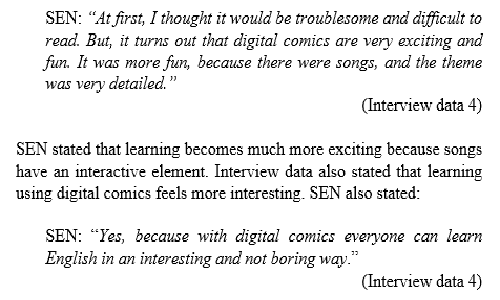Unveiling Behavioral, Cognitive, And Affective Responses of Junior High School Students to Digital Comic for Vocabulary Learning
DOI:
https://doi.org/10.31258/jes.8.4.p.791-801Keywords:
Digital Comic, Implementation, Students’ Responses, Vocabulary LearningAbstract
Vocabulary is an essential aspect of language learning, especially English. So, to attract students' interest in learning vocabulary, innovation in vocabulary teaching is needed. One innovation is using digital comics in learning. This study examines the stages of implementing digital comics in vocabulary learning and the responses produced by students towards vocabulary learning using digital comics. This research uses a qualitative method with the case study as the research design. The participants who contributed to this study were the 8th grade students consisted 6 students with the criteria of the 2 students with good English skills, 2 students with moderate English skills, and 2 students with low English skills. The data was collected with observation and interview, then the data were analyzed using thematic analysis (Braun & Clark, 2006). The findings show that there are several stages in implementing digital comics in vocabulary learning, including: (1) pre-reading activity, (2) application of digital comics in learning, (3) collaborative activity, and (4) reflection. In addition, the students also have a positive response to vocabulary learning using digital comics. With the help of visualization contained in digital comics, students feel more enjoyable and interested, actively involved in learning, improve students' concentration and critical thinking, and understand the text and unfamiliar words more easily.
Downloads

Downloads
Published
Issue
Section
License

This work is licensed under a Creative Commons Attribution-NonCommercial-ShareAlike 4.0 International License.











